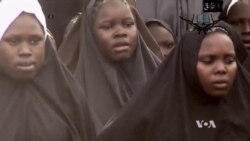WASHINGTON —
The faces of young girls held captive by Islamist militants have fueled anger and shock around the world and raised questions about why more Muslim leaders have not come forward in their defense.
The CEO of the Cairo-based Karama group, Hibaaq Osman, is among those who feel there has not been enough "noise" in the Muslim community.
"There are absolutely statements here and there, but in terms of really up in arms and going into the streets, we have not seen that,” Osman said.
Her comments came after Boko Haram militants released a video of more than 100 of the captured girls, looking sad and frightened.
She said this could be because the victims are girls who were trying to get an education.
"If we look at women's rights, in general, there is not only just in the Islamic communities, but in many communities, you have major problems with women's rights and people react more slower," Osman said.
During the past five years, Boko Haram has terrorized Nigeria with dozens of brutal, deadly attacks. The group says it is fighting to establish strict Islamic law the country's north.
The international community had been relatively silent about the attacks, said Ibrahim Hooper of the Council on American-Islamic Relations. But, he added, that's changed.
"The kidnapping of the schoolgirls really woke up the world and woke up ... the Muslim community, as well, to what's going on there," Hooper said.
The girls' plight has spurred a string of protests. Hooper said Muslims are among those who have expressed outrage.
"You have seen Muslim scholars, Muslim organizations and institutions around the world condemning Boko Haram and its actions,” Hooper said.
Boko Haram claims to embrace Islam but Hooper said the militants are trying to "hijack" the religion to advance their cause.
The CEO of the Cairo-based Karama group, Hibaaq Osman, is among those who feel there has not been enough "noise" in the Muslim community.
"There are absolutely statements here and there, but in terms of really up in arms and going into the streets, we have not seen that,” Osman said.
Her comments came after Boko Haram militants released a video of more than 100 of the captured girls, looking sad and frightened.
She said this could be because the victims are girls who were trying to get an education.
"If we look at women's rights, in general, there is not only just in the Islamic communities, but in many communities, you have major problems with women's rights and people react more slower," Osman said.
During the past five years, Boko Haram has terrorized Nigeria with dozens of brutal, deadly attacks. The group says it is fighting to establish strict Islamic law the country's north.
The international community had been relatively silent about the attacks, said Ibrahim Hooper of the Council on American-Islamic Relations. But, he added, that's changed.
"The kidnapping of the schoolgirls really woke up the world and woke up ... the Muslim community, as well, to what's going on there," Hooper said.
The girls' plight has spurred a string of protests. Hooper said Muslims are among those who have expressed outrage.
"You have seen Muslim scholars, Muslim organizations and institutions around the world condemning Boko Haram and its actions,” Hooper said.
Boko Haram claims to embrace Islam but Hooper said the militants are trying to "hijack" the religion to advance their cause.





